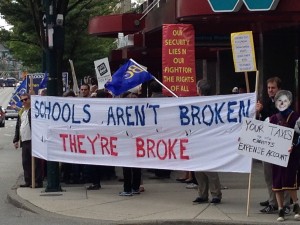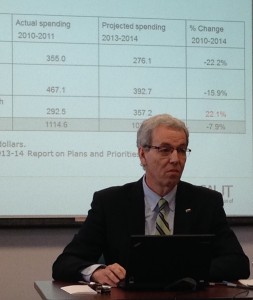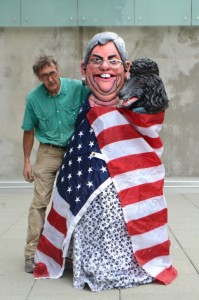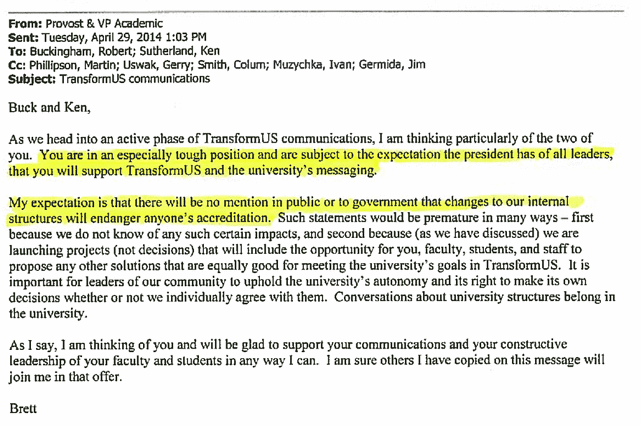From The Tyee:
Faculty Take Strike Vote at University of Northern British Columbia
Salaries a sticking point in pricey northern city.
By Katie Hyslop
The University of Northern British Columbia’s faculty association made history Jan. 15 when it became the first faculty union at a B.C. research university to take a strike vote. The vote passed with 84.8 per cent in favour of a strike, giving faculty members 90 days to take strike action.
The university, located in Prince George, has been bargaining with the faculty association for eight months, the last three with help from British Columbia Labour Board-appointed mediator Trevor Sones.
About 70 per cent of bargaining issues at UNBC have been settled, but faculty association president Jacqueline Holler says a major impasse is faculty salaries, which are as much as 24 per cent lower than salaries at similar-sized Canadian universities.
“What the employer has offered in terms of compensation does absolutely nothing to address the situation,” said Holler. Neither she nor UNBC would disclose specifics of offers on the bargaining table.
Holler said another reason faculty deserves higher pay is the university’s frequent ranking by Maclean’s magazine as one of the top three primarily undergraduate universities in Canada.
But UNBC says there are a number of factors affecting salary negotiations: Government requirements for wages to stay within fixed financial parametres; an overall decline in enrollment; an increase in the number of B.C. universities; and increased government support for trades training.
“I’m not citing those [factors] as the most important, only to suggest that there’s a number of factors that are all at play,” said Rob van Adrichem, UNBC’s vice president of external communications. “And it all affects this situation.”
Unionized last April
The vote comes after UNBC’s faculty association, representing close to 500 full and part-time instructors, became a union last April. The faculty associations at Simon Fraser University and University of Victoria unionized around the same time.
There are six research universities in British Columbia. They include UNBC, Simon Fraser University, University of Victoria, Thompson Rivers University, Royal Roads University, and the University of British Columbia.
The faculty association at the University of British Columbia became the first B.C. research university to unionize in the 1980s. In exchange for the university’s support the union gave up their right to strike. Almost 20 years later Royal Roads University’s faculty association officially became a union. Faculty at Thompson Rivers University is also unionized.
With the exception of Alberta, where law prevents university faculty associations from becoming unions, there are only four non-unionized public university faculty associations in Canada. They are at McGill, Waterloo, University of Toronto, and McMaster.
Salary disputes were the common denominator between Simon Fraser, University of Victoria, and UNBC faculty associations’ decision to unionize, says Michael Conlon, executive director of the Confederation of University Faculty Associations of British Columbia, an umbrella organization for research university faculty associations.
“I think it’s fair to say that salary increases at all the research universities in B.C. have not kept up” with the rest of Canada, Conlon said.
Attracting highly educated academics is a good reason to increase salaries, says Conlon, adding competition for “internationally renowned-faculty” is stiff both nationally and internationally.
“As B.C.’s pay scale falls farther and farther behind, I think it will be a challenge to recruit and retain the best researchers, the best teachers, and the best faculty,” he said. “I think that’s a challenge for the entire province in ensuring we’ve got a competitive and excellent system of post-secondary education.”
The faculty’s previous contract expired last June, four months after arbitrator Vince Ready released a final decision on a 2012-2014 contract, which included two retroactive pay raises of 2.5 per cent.
Ready agreed with the faculty association that salaries were low compared to other similar-sized universities, and said UNBC did have the money to raise the pay of faculty members.
Bargaining continues this weekend
But while the wage increase helped, Holler says it didn’t fix UNBC’s “broken” salary structure and was negated by similar wage increases at other B.C. universities.
Holler said living in the north is more expensive than southern B.C., a factor not taken into account when deciding faculty wages.
“In most fields if you work in the north you actually get paid a little more because they understand that it’s hard to attract people,” she said.
The faculty association still hopes to reach an agreement through bargaining, and has yet to meet to discuss strike options. UNBC undergraduate classes end April 17, two days after the strike deadline.
UNBC’s van Adrichem says the strike vote itself doesn’t have an impact on the bargaining process. “The university has been and is very keen to negotiate an agreement,” he said.
Both sides are scheduled to return to the bargaining table on Jan. 30 until Feb. 1. [Tyee]

 Follow
Follow

 THE CASE OF THE MISSING SCULPTURE
THE CASE OF THE MISSING SCULPTURE
